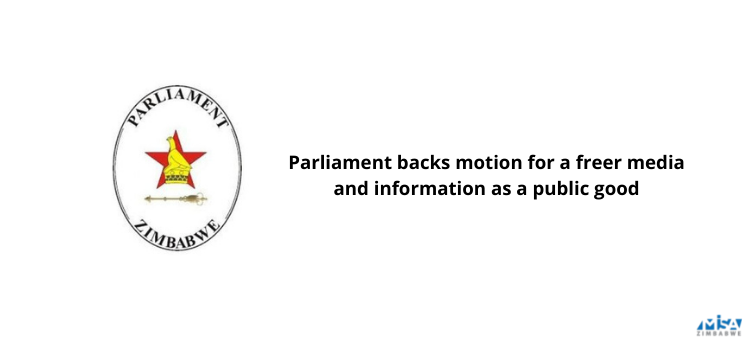Chairperson of the Parliamentary Portfolio Committee on Information, Media and Broadcasting Services, Honourable Sipho Mokone, moved a motion imploring parliament to enact legislation that enhances media freedom and encourages the media to conduct their activities without fear or favour.
The motion on, Information as a public good, moved on 15 June 2021, was supported by other legislators, among them, Honourable Webster Shamu, who urged the government to observe the provisions of the Windhoek Declaration which calls for media freedom.
Honourable Shamu also called for the expansion of the digital infrastructure to ensure greater internet access and freedom while other legislators called for the expansion of the broadcasting infrastructure and licensing of more community radio stations.
Parliament was urged to ensure the swift enactment of the Cyber Security and Data Protection Bill and Zimbabwe Media Practitioners Bill. The government is currently considering amendments to the proposed cyber law while the Draft Zimbabwe Media Practitioners Bill is still being considered by key stakeholders.
The motion comes on the backdrop of this year’s World Press Freedom Day commemorations under the theme: Information as a public good.
Honourable Mokone said information cannot be availed to all if radio stations that were awarded licenses continue not to operate. She called for policies that diversify the media industry, especially now when the country is combating the COVID-19 pandemic.
“For information to be a public good, there is need for the government to invest much on the digital economy. Right now there are still areas in Zimbabwe that do not have transmission, as such they are not getting any information.
“For us to achieve the public good concept transmitters must be put up across the country,” she said.
She stressed that it is important for the government to protect freedom of speech and freedom of the media. “The Constitution of Zimbabwe is the guiding legislation with regards to access to information and freedom of information.
“Freedom of the press refers to the right by which a journalist can express his or her opinion with the help of his or her investigation without any suppression from the government,” said Honourable Mokone.
“However, that freedom should also conform to the prevailing pieces of legislation,” she said.
The parliamentarians also noted as progressive and a step in the right direction, the enactment of the Freedom of Information Act and Zimbabwe Media Commission Act.
MISA Zimbabwe position
The expansion of the broadcasting infrastructure to cater for marginalised areas that do not have transmitters, as called for by the parliamentarians, is paramount in enhancing access to information as a public good.
However, MISA Zimbabwe implores the government to ensure diversity in the licensing and ownership of new broadcasting stations.
The call for securing a conducive environment for media freedom underpinned by professional journalism, is not only timely but critical to accessing quality and verifiable information as a public good, more so in the context of the COVID-19 pandemic.
MISA Zimbabwe, therefore, reiterates its calls for the enactment of a cybersecurity law that is in line with regional and international standards and instruments on human rights. These instruments include among others, the African Union Convention on Cyber Security and Personal Data Protection and African Declaration on Internet Rights and Freedoms.









